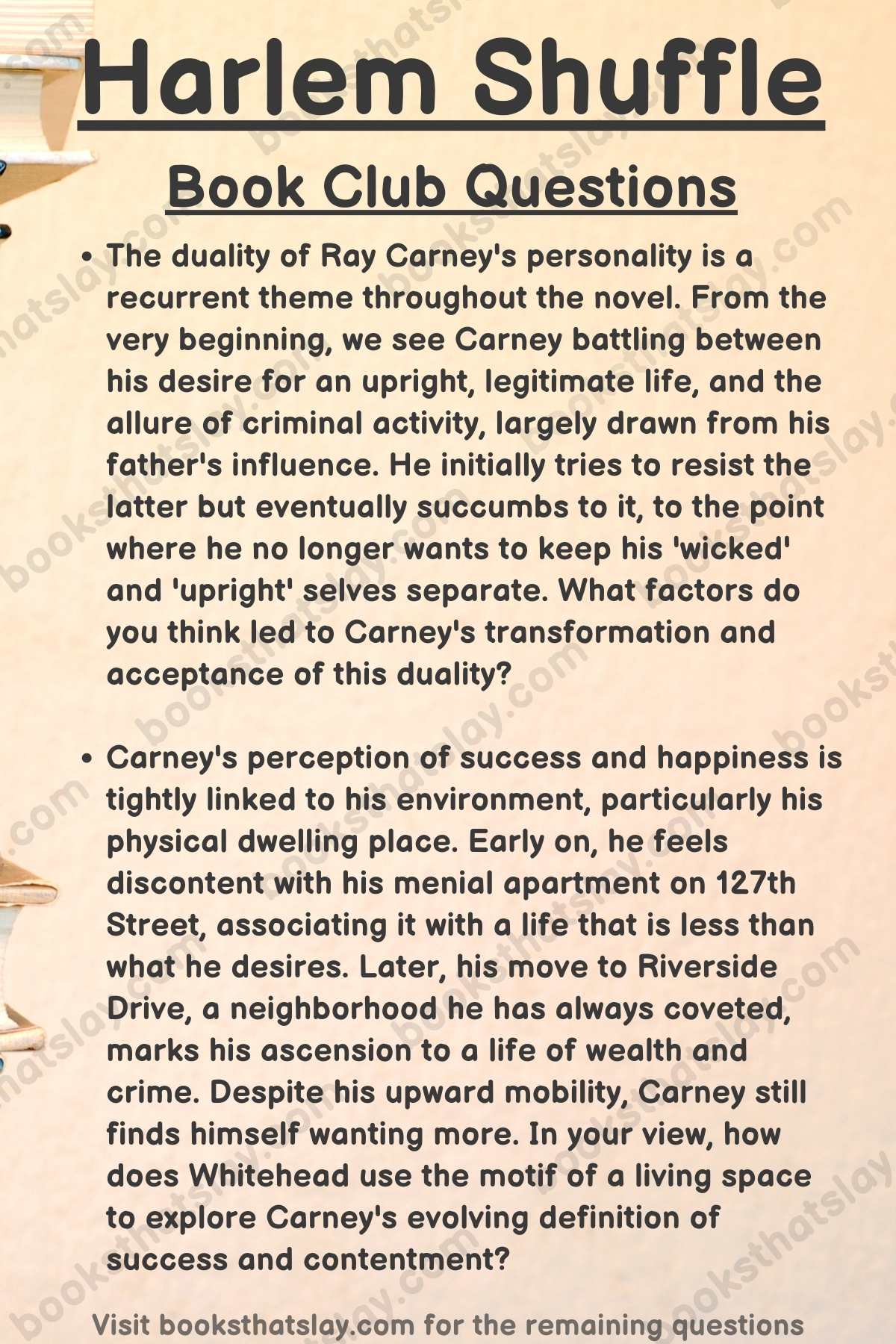10 Harlem Shuffle Book Club Questions For Discussion
Colson Whitehead’s Harlem Shuffle isn’t just a novel; it’s a rollercoaster ride through a world where appearances deceive and the American Dream is a distant mirage.
Meet Ray Carney, a seemingly ordinary furniture salesman caught in the shadow of a family steeped in crime.
When a chance encounter thrusts him into the heart of a high-stakes heist, Ray is forced to confront his past and decide where his loyalties truly lie.
As he navigates the dangerous world of Harlem, he’ll discover the complex interplay of race, power, and family that defines the era.
Join us as we explore the depths of this thrilling novel through a series of thought-provoking discussion questions.
Get ready to uncover the hidden truths and moral dilemmas that make Harlem Shuffle a modern classic.

Harlem Shuffle Book Club Questions for Discussion
- The duality of Ray Carney’s personality is a recurrent theme throughout the novel. From the very beginning, we see Carney battling between his desire for an upright, legitimate life, and the allure of criminal activity, largely drawn from his father’s influence. He initially tries to resist the latter but eventually succumbs to it, to the point where he no longer wants to keep his ‘wicked’ and ‘upright’ selves separate.
What factors do you think led to Carney’s transformation and acceptance of this duality?
- Carney’s perception of success and happiness is tightly linked to his environment, particularly his physical dwelling place. Early on, he feels discontent with his menial apartment on 127th Street, associating it with a life that is less than what he desires. Later, his move to Riverside Drive, a neighborhood he has always coveted, marks his ascension to a life of wealth and crime. Despite his upward mobility, Carney still finds himself wanting more.
In your view, how does Whitehead use the motif of a living space to explore Carney’s evolving definition of success and contentment?
- A significant character in Harlem Shuffle is Elizabeth Carney, who despite her affluent background, marries Ray and becomes a symbol of his legitimate, respectable life. She serves as a commendable figure in the narrative, working tirelessly to combat racial prejudice and advocate for civil rights.
How does Elizabeth’s character embody the struggle for societal change in the novel, and how does her role differ from Ray’s focus on individual success and familial respectability?
- Relationships in the novel often intersect with criminality, creating a complex web of trust, loyalty, and self-interest. Freddie, Carney’s cousin, persistently pulls Carney into his criminal activities. However, despite the risk, Carney still aids Freddie in multiple instances. What does this reveal about the complexities of their relationship, and how does it reflect Carney’s shifting moral compass throughout the narrative?
- The concept of revenge serves as a turning point for Carney’s character in the novel. After his humiliation by Wilfred Duke, an influential member of the Dumas Club, Carney goes to great lengths to avenge this slight. This plot line ends with Carney realizing that revenge feels like triumph.
Can you explore the ways in which this encounter with Duke and the subsequent revenge contributes to Carney’s transformation and his evolving acceptance of his criminal self?
- Throughout the book, Whitehead presents the turbulent socio-cultural environment of 1950s and 1960s Harlem as a backdrop to Carney’s personal struggles. From the role of crime in the local community to the influence of external social and political forces, Harlem is not just a setting but a character that molds Carney’s journey.
How does this historical and cultural context of Harlem impact the development of Carney’s character and his choices throughout the novel?
- A recurrent character in the narrative is Pepper, an old friend of Carney’s father, who seems to play a guiding role in Carney’s criminal journey. Despite Carney’s initial aim to distance himself from his father’s criminal legacy, Pepper’s presence and aid in multiple dangerous situations prove crucial.
How does Pepper’s character represent Carney’s complicated relationship with his father’s past, and what does it say about Carney’s acceptance of his own criminal path?
- One of the central themes of Harlem Shuffle is the idea of validation and worthiness, which is most prominently exhibited in the character of Freddie. Despite growing up in the same community as Ray, Freddie’s life takes a starkly different trajectory. His desperate search for validation leads him to make reckless decisions, seeking approval from people who often exploit his vulnerabilities.
In what ways do Freddie’s experiences reflect the socio-economic conditions and societal neglect experienced by many in the African American community during this period?
- The character of Linus offers a poignant exploration of the often catastrophic impacts of wealth and privilege, particularly when these are coupled with social exclusion and familial abuse. Linus’s privileged background starkly contrasts with Ray and Freddie’s upbringing, yet he faces his own challenges, chiefly stemming from his family’s refusal to accept his sexual orientation.
How does the novel approach Linus’s struggle with identity and acceptance in the context of his wealth and privilege? Also, how does his tragic end illuminate the destructive consequences of societal prejudice and familial abuse?
- Harlem Shuffle presents a complex narrative where characters navigate different forms of success, respectability, and validation against a backdrop of racial discrimination and socio-economic disparity. Both Ray and Freddie seek to redefine their identities and their place in society, albeit through markedly different paths.
Contrast the journeys of these two characters, exploring how their shared pasts influence their diverging paths. How does each character’s search for validation play out, and how does this reflect the broader societal and familial influences shaping their lives?
If you liked this set of questions, here are a few other options for you to explore.